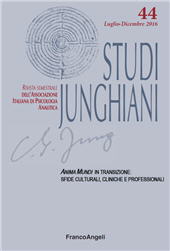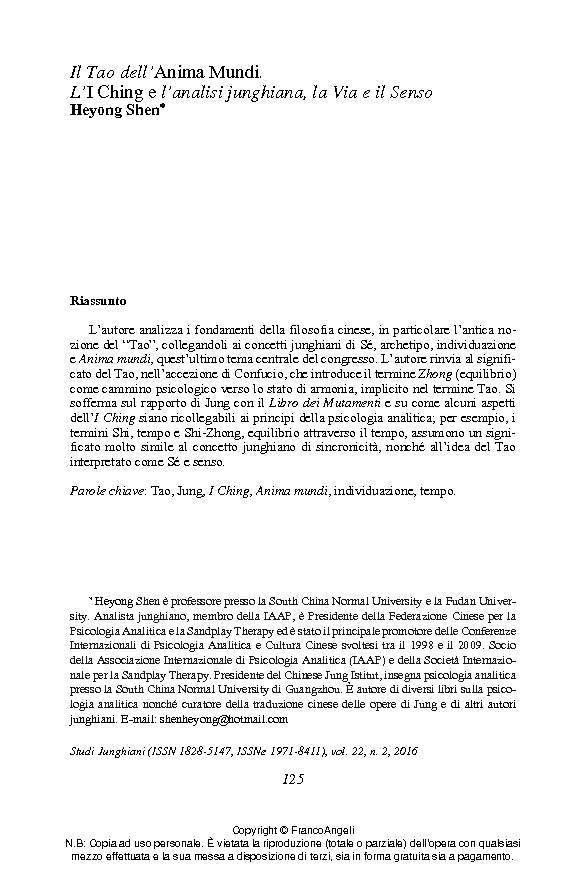Il Tao dell'Anima Mundi : l'I Ching e l'analisi junghiana, la Via e il Senso
125-144 p.
L'autore analizza i fondamenti della filosofia cinese, in particolare l'antica nozione del "Tao", collegandoli ai concetti junghiani di Sé, archetipo, individuazione e Anima mundi, quest'ultimo tema centrale del congresso. L'autore rinvia al significato del Tao, nell'accezione di Confucio, che introduce il termine Zhong (equilibrio) come cammino psicologico verso lo stato di armonia, implicito nel termine Tao. Si sofferma sul rapporto di Jung con il Libro dei Mutamenti e su come alcuni aspetti dell'I Ching siano ricollegabili ai principi della psicologia analitica; per esempio, i termini Shi, tempo e Shi-Zhong, equilibrio attraverso il tempo, assumono un significato molto simile al concetto junghiano di sincronicità, nonché all'idea del Tao interpretato come Sé e senso. [Testo dell'editore].
The author presents some Chinese philosophical ideas in order to discuss the ancient notion of "Dao", linked with the Jungian concepts of Self, archetype, Individuation process and Anima Mundi and related with the theme of the Conference. The author emphasizes the meaning pointed to by Confucius in introducing the term "Zhong" ("Equilibrium") as the psychological path to the state of harmony implied by the word Dao. The author will also mention the important relationship between Jung and I Ching and the so many aspects that connected the Book of Changes with the principles of analytical psychology; for example, the terms Shi, implied by the word Dao. The author will also mention the important relationship between Jung and I Ching and the so many aspects that connected the Book of Changes with the principles of analytical psychology; for example, the terms Shi, time and Shi-Zhong, equilibrium implied by the word Dao. The author will also mention the important relationship between Jung and I Ching and the so ma
ny aspects that connected the Book of Changes with the principles of analytical psychology; for example, the terms Shi, time and Shi-Zhong, equilibrium with time, balance through time, take on a meaning that reminds to the term synchronicity, developed by Jung and as well as the Dao concept interpreted as Self and meaning. [Publisher's Text].
Fait partie de
Studi junghiani : rivista semestrale dell'Associazione italiana di Psicologia Analitica : 44, 2, 2016-
Articles du même numéro (disponibles individuellement)
-
Informations
Code DOI : 10.3280/JUN2016-044010
ISSN: 1971-8411
DISCIPLINES
KEYWORDS
- Dao, Jung, Ching, Anima Mundi, Individuation, Timing



